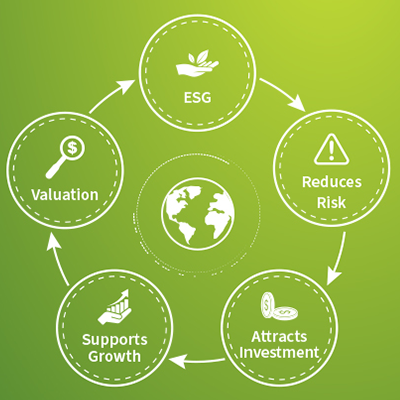ESG can only improve valuation. A sustainability policy (ESG) provides formal access to USD 25.2 trn AUM and far more AUM informally. An ESG (Environmental, Social, and Governance) policy is a set of quantifiable metrics that ‘responsible investors’ use as part of their screening/filtering process to measure a company’s sustainable business activities. The environmental criteria measures the necessary precautions that businesses take in order to ensure their activities have the least harmful effects on the environment. The social criteria assesses the company’s relationship with its employees, clients, suppliers and communities within which they are active. The governance criteria monitors the company’s leadership structure and its management of shareholder rights.
Why ESG is essential to fund raising

How to exclude yourself from USD 25.2 trillion
By not having an Environmental, Social, and Governance (ESG) policy as part of your core business by 2018, your company was excluded from USD 17.5 trn of potential investment funds. Based on our forecast in 2019 no ESG policy excludes a company from USD 21 trn and in 2020 USD 25.2 trn potential investors cash. ESG has replaced CSR (Corporate Social Responsibility) with a quantifiable set of metrics that investment/portfolio managers use as part of a screening process to measure a company’s sustainable business activities. Since its inception ESG has received measurable significant support from financial institutions (FIs). Retail investors are also joining a market previously dominated by institutional investors. Our forecasts suggest that the share of retail investment money (direct or indirect via PCBs or equivalents) will reach up to 33% of total ESG funds in 20E up from 25% in 18A.
$25.2 trillion of ESG filtered funds 20E
ESG Funds 20 E up 30% vs. 18A
+139%
Negative/exclusionary screening
+196%
ESG integration screening
+114%
Corporate engagement and shareholder action
+54%
Norms-based screening
+84%
Positive/best-in-class-screening
+1354%
Sustainability themed investing
+417%
Impact/community investing
Legend

The rise and rise of ESG
The shift to ESG and away from CSR sparked a global movement to identify how ESG filters could actually be measured. The Global Sustainable Investment Alliance (GSIA) created seven different sustainable investing asset filters which are now accepted as global standards of classification. (Exhibit 1:)
ESG now ranks as the second highest filter as measured by funds under management amongst the myriad of investing filters. In our view, this only serves to highlight the importance to companies of having a mechanism to keep track of ESG criteria.
We expect ESG to be the number 1 filter by YE20 as measured by funds under management.
Shares of Institutional vs. Retail Investors 2012-18 (USD trillion)
Institutional – 89%
Retail – 11%
2012
Institutional – 87%
Retail -13%
2014
Institutional – 80%
Retail – 20%
2016
Institutional – 75%
Retail – 25%
2018
MSCI ESG rating system – how it works
As the rate of retail investor interest grows, how to qualify ESG filters appropriately is important.
The MSCI has created an ESG rating system where companies are rated on a scale of AAA-CCC. The companies are rated based on what kind of exposure they have to the different types of ESG risks as they compare to their industry peers in terms of trying to mitigate those risks (i.e. what actions are the companies taking to comply with ESG criteria vs. their industry peers).
LEADER
AA AAA
LAGGARD
B CCC
AVERAGE
A BB BBB















